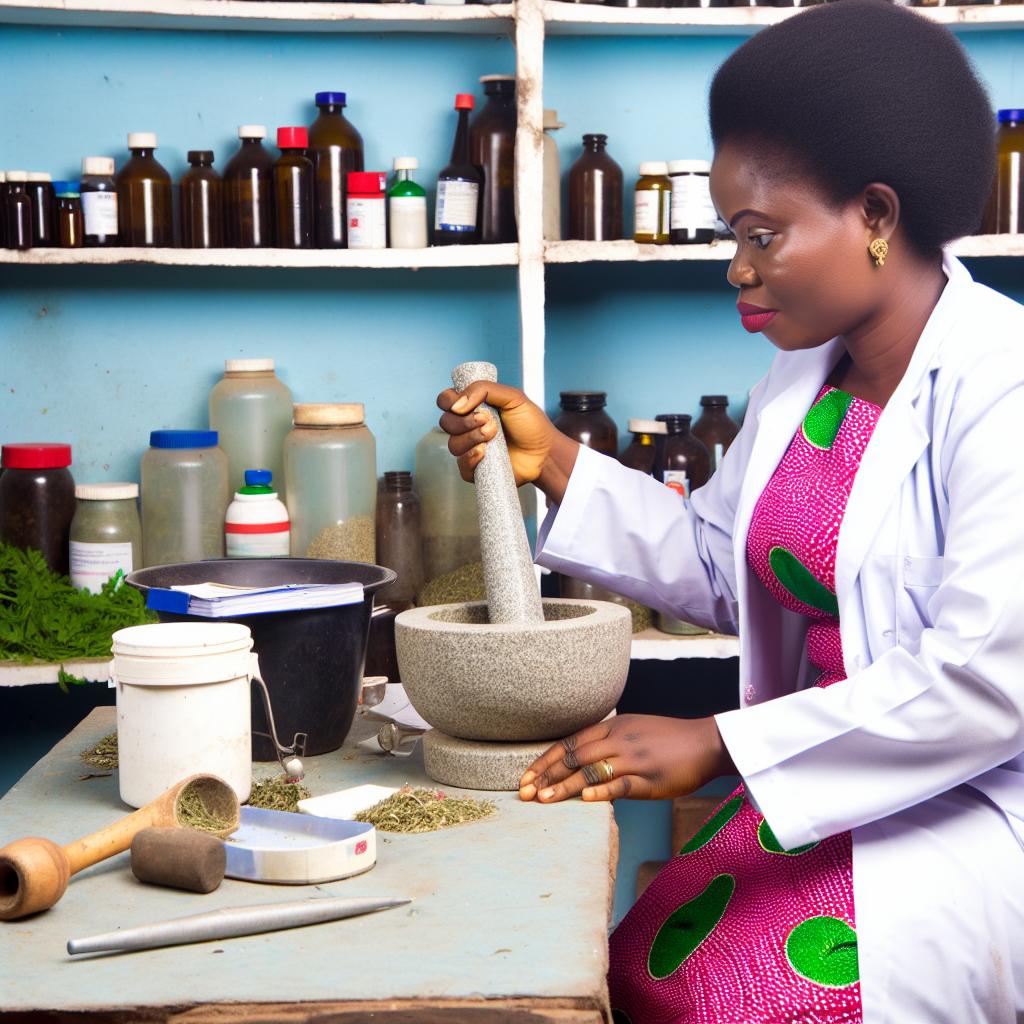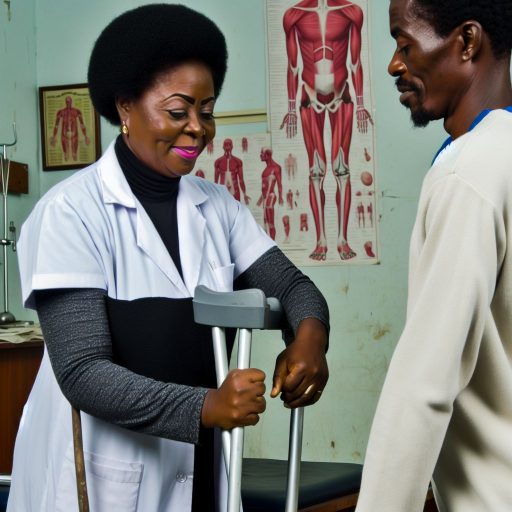Introduction:
Traditional medicine in Nigeria has deep roots in the country’s culture and history.
It plays a significant role in the healthcare practices of many communities.
This blog post will focus on the influence of traditional medicine on veterinary practices in Nigeria.
Use of Traditional Medicine in Treating Animals
Traditional medicine plays a crucial role in the treatment of animals in Nigeria.
Herbal remedies, incantations, and spiritual interventions are commonly used to address various health issues in livestock and pets.
Traditional healers possess extensive knowledge of local plants and their medicinal properties.
They employ these properties to alleviate sickness and promote overall well-being in animals.
Prevalence of Traditional Medicine in Rural Areas for Veterinary Care
In rural Nigeria, access to modern veterinary facilities is limited.
Traditional medicine remains the primary source of healthcare for animals.
Farmers and herders rely heavily on traditional healers to diagnose and treat illnesses in livestock.
The affordability and availability of traditional remedies make them a preferred choice for many rural communities.
Cultural beliefs and practices also influence the preference for traditional veterinary care over modern alternatives.
Role of Traditional Healers in Providing Veterinary Services
Traditional healers, known as ‘babalawos’ or ‘dibia’, play a vital role in providing veterinary services.
They possess a deep understanding of animal anatomy and physiology.
Traditional healing methods are passed down through generations.
Healers are often sought after for their expertise in diagnosing and treating various ailments.
They also act as advisers on preventive measures and maintaining animal health.
Emphasizing the importance of holistic care ensures long-term well-being for the animals.
Types of traditional medicine used in Nigerian veterinary practices:
Specific herbs used for treating common animal ailments:
Traditional medicine practitioners in Nigeria utilize a variety of herbs to treat common health issues in animals.
These herbs are often sourced from local plants and have been used for generations.
Use of rituals and charms in animal healing:
Rituals and charms play a significant role in traditional veterinary practices in Nigeria.
Practitioners believe that these rituals can help heal animals and protect them from further harm.
Significance of traditional beliefs in veterinary care:
Traditional beliefs are deeply ingrained in Nigerian culture and have a strong influence on veterinary care.
Many practitioners rely on these beliefs to guide their treatment methods.
Uncover the Details: Continuing Education for Nigerian Radiographers
Effectiveness of Traditional Medicine in Nigerian Veterinary Practices
Traditional medicine has been a longstanding method of treating various ailments in animals.
Let’s delve into the effectiveness of traditional medicine in these practices.
Successful Cases
Traditional medicine has shown remarkable success in treating certain conditions in animals.
For example, herbal remedies have been effective in managing skin infections and gastrointestinal issues in livestock.
Shepherds have relied on traditional knowledge to treat parasitic infestations in their sheep and goats with proven results.
Additionally, traditional bone-setting techniques have been instrumental in healing fractures in livestock.
Furthermore, traditional medicine has been successful in addressing nutritional deficiencies in animals.
Herbs like moringa and neem have been used to boost the immune system and improve overall health in livestock.
Limitations of Traditional Medicine
While traditional medicine has its merits, it also has limitations in treating certain conditions.
Serious infections or complex medical issues may not respond well to herbal remedies alone.
Some traditional practices lack scientific evidence to support their efficacy, leading to skepticism among modern veterinary practitioners.
In cases of emergency medical care, traditional medicine may not provide immediate relief or solutions.
Transform Your Career with Expert Guidance
Get personalized mentorship consulting that’s tailored to your unique path. Our expert advice is actionable and exclusive.
Get StartedAdditionally, traditional medicine may not have standardized dosages or quality control measures, which can pose risks to animal health.
It is essential to balance traditional methods with modern practices for comprehensive veterinary care.
Comparison with Modern Veterinary Practices
When comparing the effectiveness of traditional medicine to modern veterinary practices, it is evident that both have their strengths and weaknesses.
Modern practices rely on scientific research and advanced technology for diagnosis and treatment.
Modern veterinary medicine offers precise diagnostic tools like imaging studies and laboratory tests, leading to accurate treatment plans.
Surgical interventions and pharmaceutical drugs are readily available in modern practices for immediate and targeted treatments.
On the other hand, traditional medicine emphasizes holistic approaches and preventive care in animal health.
Herbal remedies and natural therapies focus on supporting the body’s innate healing abilities and promoting overall well-being.
Integrating Approaches for Optimal Animal Care
Both traditional and modern veterinary practices play essential roles in animal healthcare.
While traditional medicine has its place in Nigerian veterinary practices, it is crucial to recognize its limitations.
Supplementing traditional methods with modern techniques can lead to optimal results.
By combining the strengths of both approaches, veterinarians can provide comprehensive and effective care for animals in Nigeria.
Explore Further: Radiological Sciences: Patient Interaction Tips
Challenges faced by traditional veterinary medicine in Nigeria:
Traditional veterinary medicine in Nigeria faces several challenges that hinder its widespread acceptance and practice.
One major issue is the lack of regulation and standardization in traditional practices.
Without formal guidelines or oversight, traditional veterinarians may not adhere to safe and effective treatment methods.
This puts animals at risk of incorrect diagnosis or improper care.
In urban areas, there is a prevailing skepticism towards traditional medicine, including veterinary practices.
Many city dwellers prefer modern veterinary clinics with trained professionals and access to advanced technology.
This skepticism stems from a lack of scientific evidence supporting traditional methods.
A perception exists that traditional medicine is outdated or ineffective compared to modern practices.
Furthermore, the threat of modernization looms over traditional veterinary medicine in Nigeria.
As the country progresses economically and technologically, there is a gradual shift towards modern practices.
Traditional veterinarians must adapt to changing times and compete with modern clinics.
Modern clinics offer cutting-edge treatments and higher levels of perceived expertise.
Despite these challenges, traditional veterinary medicine holds cultural significance.
It plays a vital role in rural communities where access to modern facilities may be limited.
Efforts are being made to bridge the gap between traditional and modern veterinary practices.
These efforts include training programs for traditional healers and collaborations between practitioners.
Ultimately, finding a balance between traditional wisdom and modern advancements is crucial.
This balance ensures the well-being of animals in Nigeria and preserves the rich heritage of traditional veterinary medicine.
Gain More Insights: Biomedical Technology and Disease Management Nigeria

Cultural implications of traditional veterinary medicine:
- Traditional medicine plays a crucial role in preserving Nigerian culture and heritage.
- It is deeply rooted in the traditions and beliefs passed down through generations.
- Many rituals and practices in traditional veterinary medicine are intertwined with cultural customs.
Highlight the role of traditional medicine in preserving Nigerian culture and heritage:
- Traditional veterinary practices are seen as a vital part of Nigerian identity.
- They reflect the values, traditions, and beliefs of various Nigerian ethnic groups.
- By preserving these practices, Nigerian communities maintain a connection to their cultural roots.
Discuss the spiritual aspects of traditional healing in veterinary practices:
- Spirituality plays a significant role in traditional veterinary medicine.
- Practitioners often invoke spiritual forces and ancestors for healing animals.
- There is a belief in the interconnectedness of the physical, spiritual, and natural worlds.
Explore how traditional medicine contributes to the sense of community in rural areas:
- In rural Nigerian communities, traditional medicine fosters a sense of unity and solidarity.
- Practitioners are highly respected members of the community, often serving as spiritual leaders.
- The sharing of knowledge and practices within the community strengthens social bonds.
See Related Content: Innovations in Nigerian Anaesthesiology
Nigerian Traditional Veterinary Practices
In Nigerian veterinary practices, traditional medicine plays a significant role in providing alternative healing methods.
Furthermore, there is a need for further research to understand the efficacy of traditional remedies in veterinary care.
It is crucial to integrate traditional and modern veterinary practices for comprehensive animal healthcare.
We must appreciate and respect traditional healing methods in the veterinary field for their cultural value and potential benefits.
Additional Resources
Climate Change, Land Use, and the Decline in Traditional Fulani …
Ethno-veterinary medicine: screening of Nigerian medicinal plants …




